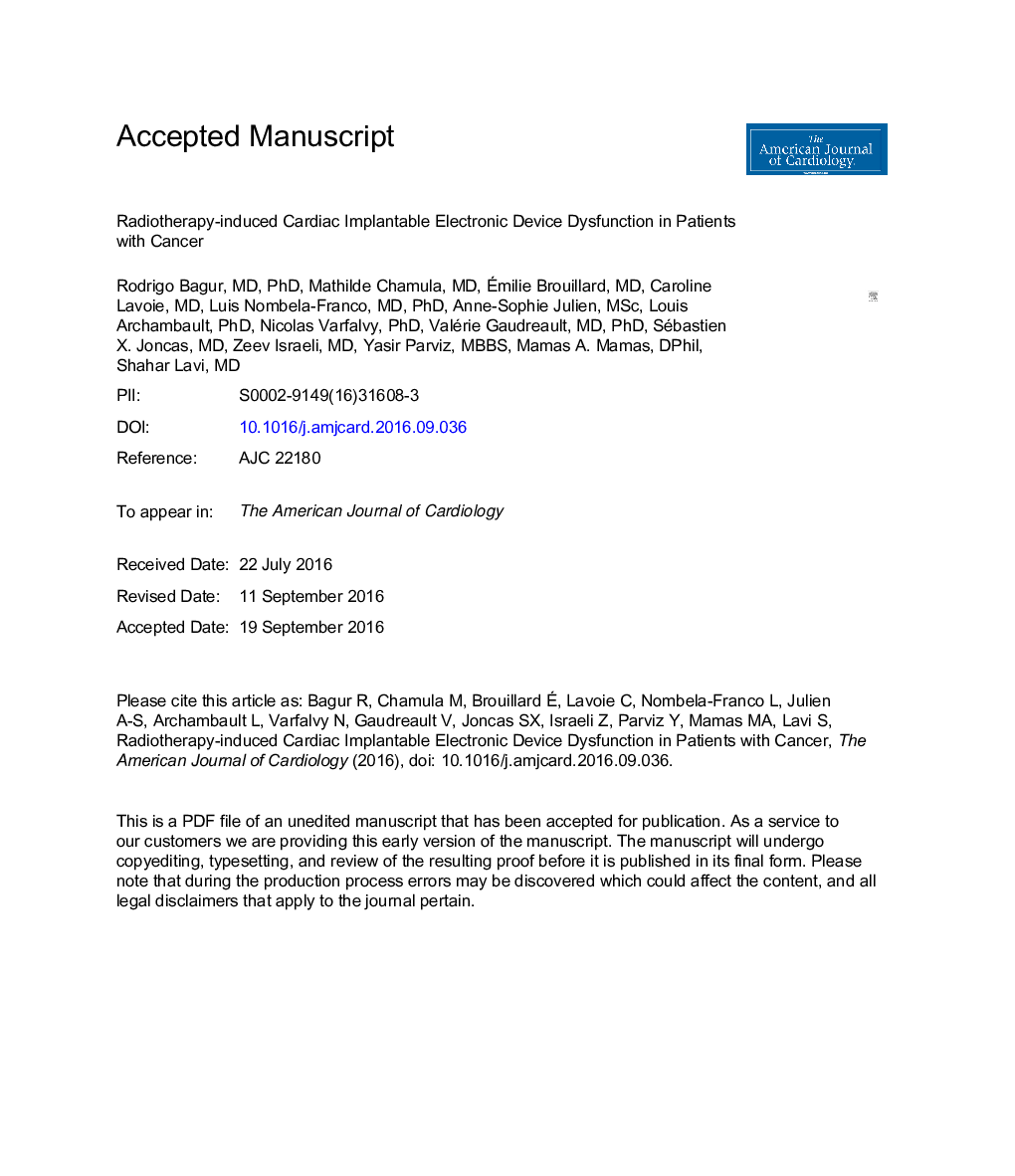| کد مقاله | کد نشریه | سال انتشار | مقاله انگلیسی | نسخه تمام متن |
|---|---|---|---|---|
| 5595259 | 1572096 | 2017 | 23 صفحه PDF | دانلود رایگان |
عنوان انگلیسی مقاله ISI
Radiotherapy-Induced Cardiac Implantable Electronic Device Dysfunction in Patients With Cancer
ترجمه فارسی عنوان
اختلال دستگاه ایمنی دستگاه ایمنی قلبی ناشی از رادیوتراپی در بیماران مبتلا به سرطان
دانلود مقاله + سفارش ترجمه
دانلود مقاله ISI انگلیسی
رایگان برای ایرانیان
موضوعات مرتبط
علوم پزشکی و سلامت
پزشکی و دندانپزشکی
کاردیولوژی و پزشکی قلب و عروق
چکیده انگلیسی
Radiotherapy can affect the electronic components of a cardiac implantable electronic device (CIED) resulting in malfunction and/or damage. We sought to assess the incidence, predictors, and clinical impact of CIED dysfunction (CIED-D) after radiotherapy for cancer treatment. Clinical characteristics, cancer, different types of CIEDs, and radiation dose were evaluated. The investigation identified 230 patients, mean age 78 ± 8 years and 70% were men. A total of 199 patients had pacemakers (59% dual chamber), 21 (9%) cardioverter-defibrillators, and 10 (4%) resynchronizators or defibrillators. The left pectoral (n = 192, 83%) was the most common CIED location. Sixteen patients (7%) experienced 18 events of CIED-D after radiotherapy. Reset to backup pacing mode was the most common encountered dysfunction, and only 1 (6%) patient of those with CIED-D experienced symptoms of atrioventricular dyssynchrony. Those who had CIED-D tended to have a shorter device age at the time of radiotherapy compared to those who did not (2.5 ± 1.5 vs 3.8 ± 3.4 years, p = 0.09). The total dose prescribed to the tumor was significantly greater among those who had CIED-D (66 ± 30 vs 42 ± 23 Gy, p <0.0001). Multivariate logistic regression analysis identified the total dose prescribed to the tumor as the only independent predictor for CIED-D (odds ratio 1.19 for each increase in 5 Gy, 95% confidence interval 1.08 to 1.31, p = 0.0005). In conclusion, in this large population of patients with CIEDs undergoing radiotherapy for cancer treatment, the occurrence of newly diagnosed CIED-D was 7%, and the reset to backup pacing mode was the most common encountered dysfunction. The total dose prescribed to the tumor was a predictor of CIED-D. Importantly, although the unpredictability of CIEDs under radiotherapy is still an issue, none of our patients experienced significant symptoms, life-threatening arrhythmias, or conduction disorders.
ناشر
Database: Elsevier - ScienceDirect (ساینس دایرکت)
Journal: The American Journal of Cardiology - Volume 119, Issue 2, 15 January 2017, Pages 284-289
Journal: The American Journal of Cardiology - Volume 119, Issue 2, 15 January 2017, Pages 284-289
نویسندگان
Rodrigo MD, PhD, Mathilde MD, Ãmilie MD, Caroline MD, Luis MD, PhD, Anne-Sophie MSc, Louis PhD, Nicolas PhD, Valérie MD, PhD, Sébastien X. MD, Zeev MD, Yasir MBBS, Mamas A. DPhil, Shahar MD,
